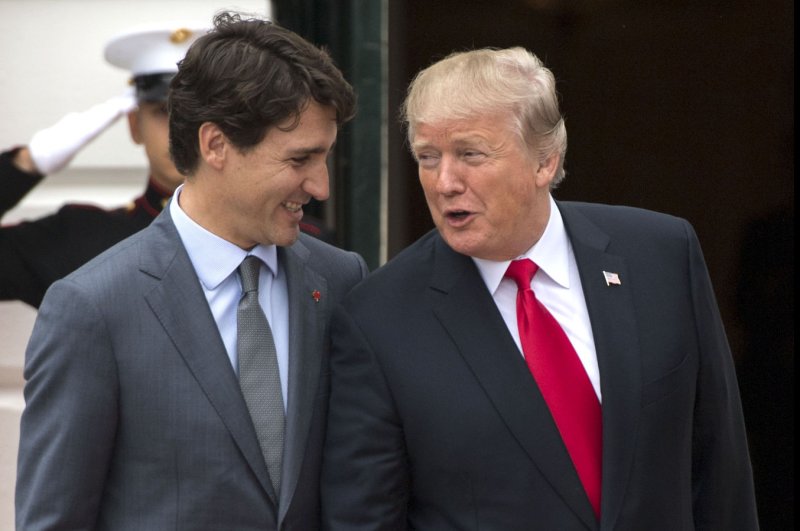President Donald Trump and Canadian Prime Minister Justin Trudeau speak as Trudeau arrives at the White House on October 11, 2017. File Photo by Kevin Dietsch/UPI |
License Photo
Sept. 20 (UPI) -- Trade talks between the United States and Canada have been burning the midnight oil this week, and officials say the discussions will resume Thursday.
U.S. Trade Representative Robert Lighthizer and Canadian Foreign Minister Chrystia Freeland will meet again Thursday. Freeland said she feels energized by the latest round.
"Trade agreements do take some time, both to negotiate and to update," she said. "We are absolutely committed to getting this right."
Canadian Prime Minister Justin Trudeau said Canada won't back down from demands for improvements to the existing North American Free Trade Agreement.
"We've been very clear that we're interested in what could be a good deal for Canada, but we're going to need to see a certain amount of movement in order to get there," Trudeau said.
Sticking points for a new NAFTA include cultural protections, dispute resolution and more U.S. access to the Canadian dairy market.
Canada also opposes one requirement, in particular, that says trade disputes must be settled in U.S. courts.
"There's not going to be an agreement where disputes are handled in the American courts. Why would we do that?" said Jerry Dias, head of Unifor, Canada's largest private-sector union. "Having Colonel Sanders take care of the chickens -- in other words, having all disputes handled in the U.S. courts -- just doesn't make any sense for Canadians."
Canada could be left out if a trade deal isn't worked out soon, as President Donald Trump has already made a deal with Mexico, the third party to the 1994 agreement. Negotiators hope to reach a deal with Canada in the next few days.
Dec. 1 also looms as the date a new Mexican government takes power -- one that may or may not support the existing deal. Leaders in Ottawa have expressed doubt the United States will proceed with a deal with Mexico, but not Canada.
Trump has said he would dump the NAFTA name, because it has a "bad connotation," and go with the new U.S-Mexico Free Trade Agreement, a threat to leave Canada out. He also threatened to sanction Canada if it doesn't cooperate.
Trudeau said he wants to see some flexibility from U.S. leaders.
U.S. negotiators are equally frustrated, including Rep. Kevin Brady, R-Texas, who said both sides are "close enough" to a new deal and it's time for Canada to "step it up." Rep. Steve Scalise, R-La., said there is a limited amount of time to get a deal done.
"Mexico negotiated in good faith and in a timely manner, and if Canada does not cooperate in the negotiations, Congress will have no choice but to consider options about how best to move forward and stand up for American workers," Scalise said.















